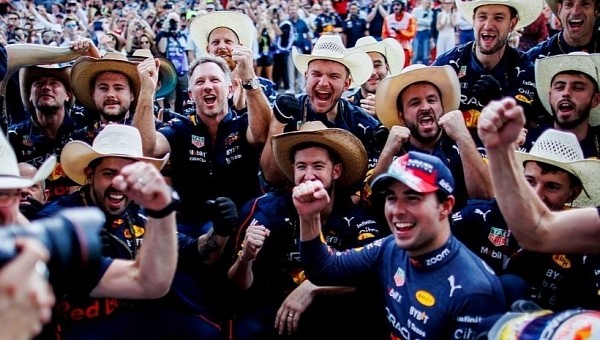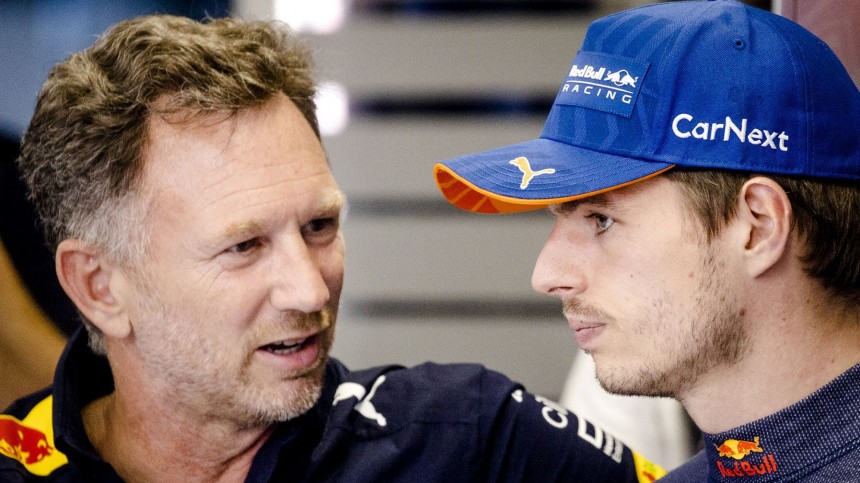This week's biggest scandal in the top tier of motorsport came to an end or at least appears to have reached the said end, when Red Bull Racing received a fine, along with a ten percent cut in aero testing time for their 2021 cost cap breach. Some say that the punishment was just a slap on the wrist, while Red Bull claims it was a big misunderstanding involving a company-wide benefit, along with a tax issue. While I was reading all this back-and-forth, I had a thought about future penalties of this type.
The team led by Christian Horner will have to pay $7 million within 30 days, which is an immense amount of money for a regular person, but is in an entirely different league when a large corporation is involved.
As a reference, earlier this year, when Mick Schumacher crashed his Haas at the Monaco Grand Prix, team manager Gunther Steiner estimated the crash cost them over $1 million, and the Saudi Arabian GP wreck also cost about $1 million.
So, the $7 million fine is roughly the material cost of crashing both Red Bull F1 cars three and a half times, which would mean three hard crashes for both, and another one extra one. Not pretty and possibly season-ending for a team that is struggling with finances.
The second penalty for Red Bull is more interesting, as it involves how much aerodynamic testing time they will be allowed to use for the development of their 2023 racing car. The winner of the Constructor's Championship always gets the least time when compared to those who came second, third, fourth, and so on, but Red Bull will have to deal with even less time than expected.
With the two FIA penalties described above, I have thought of some alternate ways to make teams make up for their unintentional (as well as intentional) mistakes instead of money. Sure, they will pay their dues, but I propose that something good should come from all these penalties.
To be clear, I am currently not aware of what the FIA does with the money it raises from these penalties, so I may be wrong. However, I suggest the FIA takes the money from any F1 team it decides to fine according to the rules and helps fund teams of beginner racers in the lower tiers of the sport.
Or maybe the money will help feeder series like the W Series or the new female-only feeder series planned by F1 for 2023. Seven million U.S. dollars might not fund the entire W Series for too long, but it will help pay some bills to ensure that racing still happens.
It would also help if the F1 teams would have to take on a racer from one or several feeder series and train them alongside their main athletes. Making such deals mandatory would help raise the competitive level of the feeder series.
I am not the first person in the world to think of this, and I have seen something similar in a national sporting series where athletes who were fined by the sports' governing federation requested that the money from their fines be given to juniors in the sport.
I thought that the proposition described is a noble idea and if anyone from the FIA is reading this, or an article inspired by this one, I hope that it will help fund several karting seasons for young racers somewhere in the world.
As they say, children are the future of our planet, and the top-tier level of sport has plenty of money going around, so why not make an F1 team go and help those in need to continue racing? Could you imagine what it would be like if various F1 drivers, along with team principals and key people in their teams, would go and personally support young racers who are at the beginning of their careers in the sport?
This way, instead of just seeing money move from one organization's account to another, arranging various CSR (corporate social responsibility) activities for key team members would be a more effective way to spend money and everyone's time when they are not racing.
The only caveat to this is that it might shed a potentially negative light on helping others, but if this is the only way that the teams decide to do this, maybe this should be the way to go so that the future names in the sport might even include someone who was not wealthy growing up but was assisted by an F1 team that discovered them on a go-kart track after the team made a minor breach of the rules.
If you ask me, that sounds like a win-win for everyone involved. The only displeased person might be Toto, but that is another story.
As a reference, earlier this year, when Mick Schumacher crashed his Haas at the Monaco Grand Prix, team manager Gunther Steiner estimated the crash cost them over $1 million, and the Saudi Arabian GP wreck also cost about $1 million.
So, the $7 million fine is roughly the material cost of crashing both Red Bull F1 cars three and a half times, which would mean three hard crashes for both, and another one extra one. Not pretty and possibly season-ending for a team that is struggling with finances.
The second penalty for Red Bull is more interesting, as it involves how much aerodynamic testing time they will be allowed to use for the development of their 2023 racing car. The winner of the Constructor's Championship always gets the least time when compared to those who came second, third, fourth, and so on, but Red Bull will have to deal with even less time than expected.
To be clear, I am currently not aware of what the FIA does with the money it raises from these penalties, so I may be wrong. However, I suggest the FIA takes the money from any F1 team it decides to fine according to the rules and helps fund teams of beginner racers in the lower tiers of the sport.
Or maybe the money will help feeder series like the W Series or the new female-only feeder series planned by F1 for 2023. Seven million U.S. dollars might not fund the entire W Series for too long, but it will help pay some bills to ensure that racing still happens.
It would also help if the F1 teams would have to take on a racer from one or several feeder series and train them alongside their main athletes. Making such deals mandatory would help raise the competitive level of the feeder series.
I thought that the proposition described is a noble idea and if anyone from the FIA is reading this, or an article inspired by this one, I hope that it will help fund several karting seasons for young racers somewhere in the world.
As they say, children are the future of our planet, and the top-tier level of sport has plenty of money going around, so why not make an F1 team go and help those in need to continue racing? Could you imagine what it would be like if various F1 drivers, along with team principals and key people in their teams, would go and personally support young racers who are at the beginning of their careers in the sport?
This way, instead of just seeing money move from one organization's account to another, arranging various CSR (corporate social responsibility) activities for key team members would be a more effective way to spend money and everyone's time when they are not racing.
The only caveat to this is that it might shed a potentially negative light on helping others, but if this is the only way that the teams decide to do this, maybe this should be the way to go so that the future names in the sport might even include someone who was not wealthy growing up but was assisted by an F1 team that discovered them on a go-kart track after the team made a minor breach of the rules.
If you ask me, that sounds like a win-win for everyone involved. The only displeased person might be Toto, but that is another story.
















